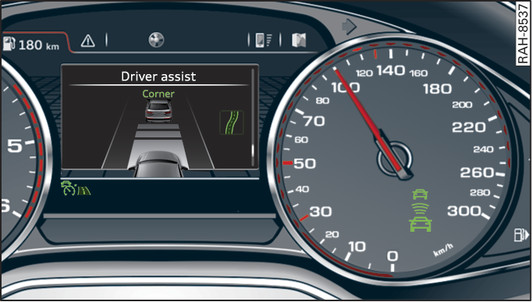|
|
Applies to: vehicles with Audi adaptive cruise control and predictive efficiency assist
Description
The predictive control1) uses map information from the navigation system to anticipate the route and drive accordingly. Information from the camera-based traffic sign recognition* system is also applied link►.
When it detects an impending speed limit or a change in the road ahead (e.g. a bend, intersection or roundabout), the system applies the brakes automatically and accelerates again afterwards up to the cruising speed.
(Automatic gearbox:) It also uses the intelligent coasting function for automatic cruise control link►.
Overriding the regulating function
The driver can override the predictive control at any time by pressing the accelerator or brake pedal. In addition, the operating lever
fig.► can be used to change the speed limit control response. The predictive control is deactivated if the driver makes a significant change to the speed limit control response. The adaptive cruise control regulates the speed to match the desired value.
Always switch off the predictive control in the following situations:
- In situations requiring extra care and attention from the driver.
- In poor weather, for instance in snow or heavy rain.
- In poor road conditions.
Display in the instrument cluster
When the adaptive cruise control is switched on initially, the availability of the predictive control is indicated in the status line by a driver message.
When a speed limit is detected and the vehicle speed adjusted accordingly, the symbol  70
70  appears. In this case, the system will regulate the speed to 70 km/h. This speed is then applied by the adaptive cruise control. The LEDs in the speedometer dial will be adjusted to match the new cruising speed
fig.►.
When a change in the road is detected and the vehicle speed adjusted accordingly, the symbol
appears. In this case, the system will regulate the speed to 70 km/h. This speed is then applied by the adaptive cruise control. The LEDs in the speedometer dial will be adjusted to match the new cruising speed
fig.►.
When a change in the road is detected and the vehicle speed adjusted accordingly, the symbol 
 Fig. 110► appears.
Fig. 110► appears.
 70
70  appears. In this case, the system will regulate the speed to 70 km/h. This speed is then applied by the adaptive cruise control. The LEDs in the speedometer dial will be adjusted to match the new cruising speed
fig.►.
When a change in the road is detected and the vehicle speed adjusted accordingly, the symbol
appears. In this case, the system will regulate the speed to 70 km/h. This speed is then applied by the adaptive cruise control. The LEDs in the speedometer dial will be adjusted to match the new cruising speed
fig.►.
When a change in the road is detected and the vehicle speed adjusted accordingly, the symbol 
 Fig. 110► appears.
Fig. 110► appears.
While the Driver assist display is on the instrument cluster, the following symbols show the event to which the system is currently reacting:
Symbol
|
Meaning |
km/h
| Speed limit |

| Bend |

| Intersection |

| Roundabout |
WARNING
- Always direct your full attention to the road and surroundings, even when you are using the predictive control. It is always the driver s responsibility to assess the traffic situation and take appropriate care.
- The system does not give way to priority traffic and does not stop at traffic lights - risk of accident!
- The system only responds to traffic signs specifying a speed limit.
- A speed limit infringement may occur if the system responds incorrectly to a speed limit. As the driver you are always responsible for keeping within the maximum speed limit.
- The speed at which the system drives the vehicle through a corner may not correspond to your own driving style. Apply the brakes manually as appropriate - risk of accident!
Note
- The set speed in the LEDs on the speedometer dial is adjusted when a speed limit is detected even when the adaptive cruise control is inactive.
- When the vehicle is coasting, the actual road speed may occasionally exceed or fall below the set speed.
- The system s control response depends on the driving mode set in drive select*.
- The deactivation of the predictive control, e.g. when entering a traffic-calming zone, does not cause the deactivation of the adaptive cruise control.
- When you switch on the ignition and subsequently enter a motorway with no speed limit, the system initially regulates the speed to 130 km/h. After this, the last speed stored by the driver is applied.
- Predictive control does not occur in areas with speed limits below 30 km/h.
- If a speed limit is only detected by the camera and you are driving at a much faster speed, the speed limit will flash on the display until the vehicle reaches the specified speed link►.
- If incorrect values are supplied by the camera-based traffic sign recognition* or if the map material on the navigation system is out of date, this can cause failures or implausibilities in the control response.
- While route guidance is active on the navigation system, the control uses the navigation route as a reference. Implausibilities in the control response can occur when route guidance is inactive or if you leave the route.
- The system is automatically deactivated when you leave the road area mapped on the navigation system.

